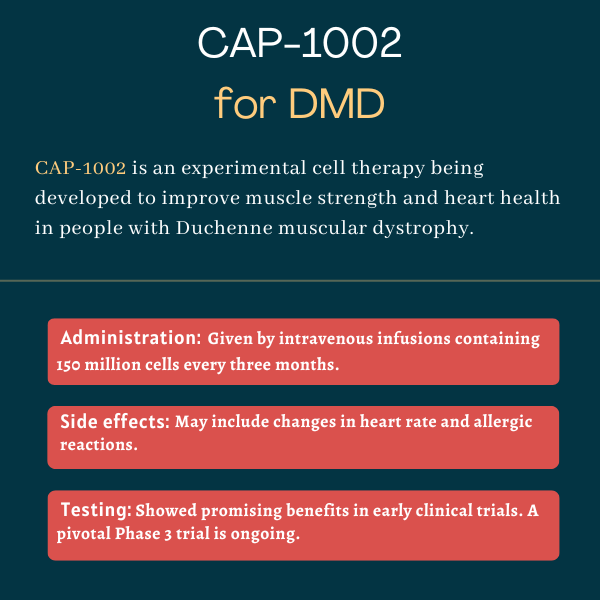CAP-1002 for Duchenne muscular dystrophy
Last updated June 17, 2024, by Marisa Wexler, MS

What is CAP-1002 for Duchenne muscular dystrophy?
CAP-1002 is an investigational cell therapy designed to improve muscle strength and heart health in people with Duchenne muscular dystrophy (DMD).
Being developed by Capricor Therapeutics, CAP-1002 promotes muscle repair through its immune modulating, anti-inflammatory, and anti-scarring properties. It is given by an intravenous, or into-the-vein, infusion.
The U.S. Food and Drug Administration has granted CAP-1002 regenerative medicine advanced therapy, orphan drug, and rare pediatric disease designations. These are all expected to accelerate the development of experimental therapies with the potential to improve care for serious or rare diseases.
In the U.S., Capricor is responsible for the development and regulatory approval of CAP-1002. But the company entered an agreement with Japan-based Nippon Shinyaku, making it solely responsible for marketing the therapy in the U.S. upon the therapy’s approval.
Therapy snapshot
| Treatment name: | CAP-1002 |
| Administration: | Intravenous infusion |
| Clinical testing: | Being investigated in a pivotal Phase 3 trial in DMD patients |
How does CAP-1002 work?
DMD is a genetic disorder caused by the absence of dystrophin, a protein that plays an essential role in maintaining muscle cells. It is characterized by progressive muscle degeneration and weakness. The lack of dystrophin in the heart muscle makes it weak and causes scarring, a condition called cardiomyopathy, which is the leading cause of death in DMD patients.
CAP-1002 is made of cardiosphere-derived cells (CDCs), progenitor cells that are able to grow into mature heart cells and release signaling molecules to promote heart muscle health. These cells also release tiny sacs called exosomes that contain cellular material, including so-called micro RNA molecules. These alter gene activity and help to lower inflammation, stimulate tissue regeneration, and reduce fibrosis (scarring).
In DMD mouse models, the CDC-based therapy promoted repair of both cardiac muscle cells in the heart and skeletal muscle cells that move the body. CDCs also inhibited scarring, inflammation, and a type of cell damage called oxidative stress.
The CDCs in CAP-1002 come from the heart tissue of a healthy donor. They are grown in a laboratory and stored until needed.
How will CAP-1002 be administered in DMD?
In more recent clinical trials, CAP-1002 was administered via infusion into the bloodstream every three months, with each infusion containing 150 million CDCs.
However, it’s still not known if these are the dose and regimen that will be used if and when the therapy is ultimately approved by regulatory authorities.

CAP-1002 in clinical trials
While preclinical studies suggested that CAP-1002 may work at all stages of DMD, Capricor has mainly focused on developing the therapy for patients who are unable to walk, a population with limited treatment options and significant unmet needs.
After an open-label Phase 1/2 clinical trial called HOPE-Duchenne (NCT02485938) showed that CAP-1002 reduced heart muscle scarring in mostly nonambulatory DMD adults and adolescents, the company launched the HOPE-2 Phase 2 trial (NCT03406780) to compare CAP-1002 with a placebo.
Phase 2 HOPE-2 trial
The double-blind HOPE-2 trial, launched in 2018, enrolled 20 boys and young men, ages 10 and older, who had relatively advanced DMD. About 90% of them were unable to walk.
Participants were randomly assigned to receive CAP-1002 (150 million cells per infusion) or a placebo, given intravenously every three months for a year. All were given standard corticosteroid treatment.
The trial’s main goal was to determine whether CAP-1002 could slow arm function decline, as measured by changes in a validated test called Performance of the Upper Limb (PUL) 1.2 after one year. While PUL 1.2 scores declined in both groups, that decline was significantly slower (by 71%) for patients given CAP-1002.
The medication also improved cardiac muscle structure and function. For example, left ventricle ejection fraction, which is an assessment of how much blood the heart pushes out to the body with each pump, was 4% higher among CAP-1002-treated patients compared with those on a placebo.
Treatment was generally well tolerated. Seven treatment-emergent adverse events were related to CAP-1002 or the administration procedure. Three treated patients experienced allergic reactions, but only one such event occurred after the trial’s protocol was amended to include a pretreatment regimen of high-dose steroids and medications for allergic reactions.
Following a gap of about one year on average, during which patients continued to be monitored without treatment, 13 participants who completed HOPE-2 then entered an open-label extension study (NCT04428476), wherein all are receiving up to 16 additional CAP-1002 infusions over a total of four years. Two-year results showed sustained slowing of upper limb and heart function declines, as well as a 64% reduction in disease progression overall.
Phase 3 HOPE-3 trial
The therapy is now being tested in a Phase 3 study called HOPE-3 (NCT05126758) that, pending positive results, may support applications requesting its approval.
The study plans to enroll about 102 boys and young men with DMD, ages 10 and older, who have impaired skeletal muscle function. They may or may not be able to walk independently.
Participants will be given infusions of CAP-1002 (150 million cells per infusion) or a placebo every three months for a year. An initial group of 58 patients will receive CAP-1002A, made at Capricor’s manufacturing facility in Los Angeles. Then, a second group of 44 participants will be enrolled and dosed with CAP-1002B, manufactured at Capricor’s facility in San Diego.
The study’s main goal, which will be assessed in each group separately, is to determine changes in upper limb function after one year, as assessed with the Performance of the Upper Limb test 2.0 (PUL 2.0). Secondary measures include cardiac muscle function and structure, changes in hand-to-mouth function, quality of life, and a biomarker of heart muscle damage.
An interim futility analysis — that is, a test to ensure that it’s still mathematically possible for the study to have positive results — was conducted in late 2023, and results indicated the trial could continue as planned.
After receiving the initial four infusions in the main trial, all patients will be eligible to receive four more doses of CAP-1002 for an additional 12 months as part of an open-label extension period.
Common side effects of CAP-1002
In early clinical trials, CAP-1002 was generally well tolerated with few safety issues. The most common side effects deemed related to the cell-based therapy or the administration procedure included:
- atrial fibrillation, when the heart’s upper chambers (atria) beat irregularly
- fever and confusion
- allergic reactions.
Muscular Dystrophy News Today is strictly a news and information website about the disease. It does not provide medical advice, diagnosis, or treatment. This content is not intended to be a substitute for professional medical advice, diagnosis, or treatment. Always seek the advice of your physician or other qualified health provider with any questions you may have regarding a medical condition. Never disregard professional medical advice or delay in seeking it because of something you have read on this website.
Recent Posts
- As a caregiver for my sons with DMD, how do I know what is right?
- New study may help more DMD patients be included in clinical trials
- I wish more facilities considered accessibility and privacy
- FDA OKs clinical trial of DMD stem cell therapy MyoPAXon
- How a son’s MRI stirred up fields of dreams and hopes
- DMD treatment SAT-3247 moves toward 1st trial
- My body clock ticks louder because of my Duchenne MD
- First oculopharyngeal MD patient sees better swallowing with BB-301
- Fun summer activities that are still doable with Duchenne
- Losmapimod improved, stabilized FSHD upper limb function: Study
Related articles






